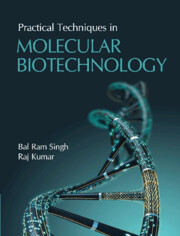Preface
Published online by Cambridge University Press: 15 October 2021
Summary
Over the last 50 years, the development of far superior understanding of genomics and proteomics, has spurred the growth of biotechnology to a level where the revenues the sector generates are now of the order of about $430 billion a year and growing at approximately 8.3%. Directed manipulation of cell genes and development of recombinant technologies are allowing research institutions and industry to create fresh platforms for development of new technologies, products, markets, and indeed expectations. All this is contributing to ever increasing the pervasive influence of the biological organism in our everyday life.
Use of biotechnological processes is not new. For centuries some of these techniques have been used in the manufacturing of wines, beers, milk-based products, bread, and so many others. Although how biological mechanisms worked exactly was not well understood, the optimized biotechnological processes involved for such manufacturing were well established.
A fascinating aspect of biotechnology is its multidisciplinary nature, which draws upon concepts, theory and practices from a gamut of different fields including biology, chemistry, biochemistry, molecular biology, genetics, microbiology, and process engineering.
Although there are several books available on bioanalytical techniques, cellular biology, molecular biology, biotechnology, and so on, there is no readily available source of information that comprehensively yet concisely presents the techniques employed in biotechnology. Accordingly, a book covering the range of principles and applications of biotechnology should be handy for research students.
One of the goals of a science education is to inculcate scientific literacy in such a way that students should be free of any bias while making decisions on day-to-day scientific problems. In this case, the purpose of such education is that students imbibe adequately, the principles, the theory and applications thereof, to develop laboratory and practical research skills focused on the solution of a real scientific problem. This book, on biotechnology, intends doing just that.
Our intention is to familiarize students with the basics of some of the well-known experimental biotechnology processes and practices, for their use and application in research. By referring to this book, students will find the contents useful in strengthening their basic skills in their field of interest and applying their learning to real-world problems. In the experience of the authors, a focus on practical problems helps students learn biochemical techniques in a context, and allows better integration with research projects.
- Type
- Chapter
- Information
- Practical Techniques in Molecular Biotechnology , pp. xxi - xxiiPublisher: Cambridge University PressPrint publication year: 2022



